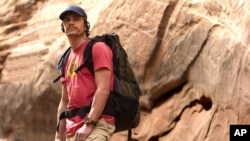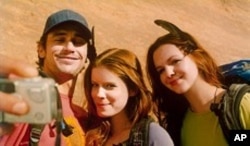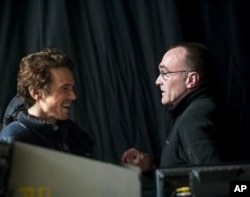The new film from Oscar-winning director Danny Boyle tells a remarkable true story of courage and survival. James Franco stars as a young outdoorsman who makes an unthinkable decision when his arm is trapped by a boulder in a remote canyon. Alan Silverman has this look at the intense and uplifting drama 127 Hours.
April 2003: Aron Ralston, 26, is on a solo hike deep in the Canyonlands National Park of Utah in the American west. A loose boulder sends him tumbling into a deep crevasse and pins his right arm to the canyon wall. Wedged in place, it will not budge, no matter what he tries:
"This marks 24 hours of being stuck. I've been chipping away, more to keep warm than anything. I have about 150ml of water left, which should keep me alive until tomorrow night …if I'm lucky."
Twenty-four hours stretches into 48, then 72. He didn't tell anyone where he was hiking, so Aron knows his chances for rescue are nil as he chronicles the ordeal in a video diary on the camera he carried in his backpack. Finally after five days he decides he must cut off his arm in order to escape; all he has is a dull camping knife, but he manages the grueling amputation, drags himself out of his rocky prison and hikes out to safety.
In his memoir - Between A Rock and A Hard Place -Aron Ralston wrote about his ordeal and says watching it recreated as "127 Hours" is a somewhat surreal experience.
"It is very emotional for me," admits Ralston. "It's fun. It is really fascinating to watch, as well; but the most heart-wrenching parts of it are the episodes and vignettes that draw me back to the gratitude that I have for my family. I found myself, during the entrapment scene as well as the climactic amputation scene, just watching the movie as a really well told story …very well made and very authentic as well; but the emotions really come up when I'm connected mostly with my family."
"Mom, dad …I haven't appreciated you as I know that I could. I love you guys and I'll always be with you."
James Franco plays Aron in 127 Hours and says meeting the real person and watching his original video diary put him in touch with those emotions and the character's spirit.
"It was our job to make that experience feel authentic," explains Franco. "The best way to achieve that was not to slavishly mimic or imitate Aron's every gesture, but instead talk to Aron as much as we could beforehand, but after that put ourselves in our own canyon and figure it out for ourselves. Do everything that Aron did, but kind of have that experience. So that dictated a lot of the way that we made it and shot it and durations of takes and all that. There was like an 'inside-out' approach."
The screenplay is by Simon Beaufoy, whose previous collaboration with director Danny Boyle was the 2008 Oscar-winner Slumdog Millionaire. Beaufoy believes it is not the physical crisis, but the emotional transformation that makes 127 Hours such compelling drama.
"It's not really about a guy chopping his arm off, of course. It's about someone who has turned his back on his friends and his family and society and goes through this extraordinary change," notes Beaufoy. "He's forced by events to re-examine his life, where he went wrong, what he could have done differently, people he could have treated in a slightly kinder way, maybe; and he comes out of the canyon at the other end someone who wants to reconnect with the world and the people he loves around him."
Still, the amputation is a critical moment in the story and Danny Boyle says he knew it would be a challenge for filmmaker and audience alike.
"We based it very, very closely on what is in the book," explains Boyle. "In reality it took him over 40 minutes and involved a series of plateaus of pain that he had to live through; but most importantly, it was a passage way to something else. It was a delivery to life again …a doorway, a portal to being reborn, really. Aron describes it as an ecstasy of feeling that he is driven through and you have to try to capture that in cinema. It is exhilarating. It is disturbing and overwhelming, but exhilarating as well."
In fact, Boyle sees the end result as unexpectedly uplifting.
"You often get used to the expression 'a feel-good movie' and it seems a funny thing to apply to this movie; but the expression …and I've done one of them …often represents what is really basically a cheap thrill in many ways," Boyle says. "There's nothing wrong with that. I love them; but this is a much more profound feeling of euphoria that you arrive at, because you've also been through a great deal to get there. Not as much as he has, obviously, but you've participated in it in some way."
"Don't give up. Aron, do not give up."
For most of 127 Hours James Franco is on screen alone, with occasional flashbacks to moments from his life before the accident and visions of what it might be like if he survives. Now wearing a prosthetic arm, Aron Ralston still climbs mountains and explores canyons. He also travels the world as an inspirational speaker.








